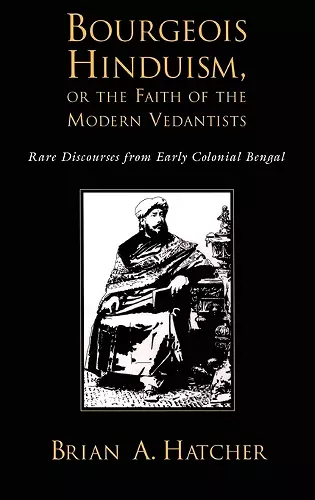Bourgeouis Hinduism, or Faith of the Modern Vedantists
Rare Discourses from Early Colonial Bengal
Format:Hardback
Publisher:Oxford University Press Inc
Published:6th Dec '07
Currently unavailable, and unfortunately no date known when it will be back

In 1839 a group of Hindu elite gathered in Calcutta to share and propagate their faith in a non-idolatrous form of worship. The group, known as the Tattvabodhin Sabh, met weekly to worship and hear discourses from members on ways to promote a rational and morally responsible mode of worship. They called upon ancient sources of Hindu spirituality to guide them in developing a modern form of theism they referred to as "Vedanta." In this book, Brian Hatcher situates the theology and moral vision set forth in these hitherto unknown discourses against the backdrop of religious and social change in early colonial Calcutta. In doing so, he demonstrates how the theology of the Tattvabodhin Sabh legitimated the worldly interests of Calcutta's emergent bourgeoisie. This 'bourgeois Vedanta' sanctioned material prosperity while providing members with a means of spiritual fulfillment. Hatcher's important study includes the first ever complete, annotated translation of Sabhyadiger vaktrta, the earliest extant record of the Tattvabodhin Sabh. The translation is supplemented with a detailed analysis of the text demonstrating that its twenty-one unsigned discourses were composed by such major figures in nineteenth-century Bengal as Debendranath Tagore, Isvaracandra Vidyasagara, Isvaracandra Gupta, and Aksayakumara Datta. In many cases, these are the earliest known writings we have for such individuals. This rare set of discourses provides Hatcher with an opportunity to explore a decisive moment in the construction of modern Vedanta, and to comment on the concerns this Vedantic movement raised for contemporary Christian observers. Hatcher is able to demonstrate the decisive role played by the Tattvabodhin Sabha in both reviving and reformulating the teachings of Rammohan Roy, the founder of Vedantic reform in colonial India. At the same time, Hatcher suggests that the earliest members of the Sabha are best viewed as 'Brhamos without Rammohan.' Only later would they look to Rammohan as their founding father. Apart from bringing to light the guiding ideals of an association that was to have a profound influence on religious and intellectual life in nineteenth-century Bengal, Hatcher's analysis will promote reflection on a variety of topics central to understanding the development of modern forms of Hindu belief and practice.
The book illuminates the origins and first expression of what was to become a powerful intellectual movement. * Rosane Rocher, Journal of the American Oriental Society *
This beautifully written book confirms Brian Hatcher's reputation as an exceptionally painstaking and sensitive scholar of religious movements in nineteenth-century Bengal. * William Radice, Bulletin of the School of Oriental & African Studies *
ISBN: 9780195326086
Dimensions: 157mm x 236mm x 23mm
Weight: 539g
240 pages